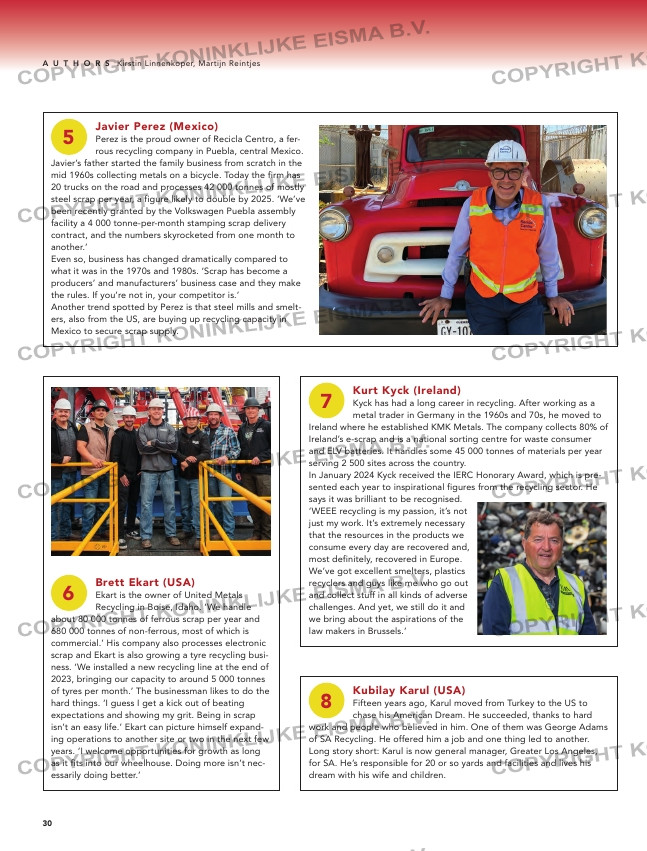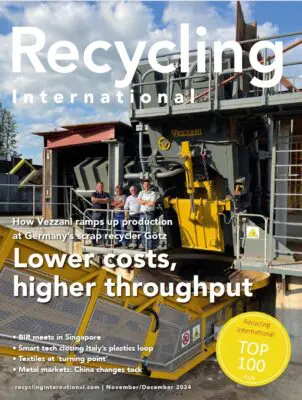Page 30 from: Recycling International November/December issue 2024

30
A U T H O R S Kirstin Linnenkoper, Martijn Reintjes
Javier Perez (Mexico)
Perez is the proud owner of Recicla Centro, a fer-
rous recycling company in Puebla, central Mexico.
Javier’s father started the family business from scratch in the
mid 1960s collecting metals on a bicycle. Today the firm has
20 trucks on the road and processes 42 000 tonnes of mostly
steel scrap per year, a figure likely to double by 2025. ‘We’ve
been recently granted by the Volkswagen Puebla assembly
facility a 4 000 tonne-per-month stamping scrap delivery
contract, and the numbers skyrocketed from one month to
another.’
Even so, business has changed dramatically compared to
what it was in the 1970s and 1980s. ‘Scrap has become a
producers’ and manufacturers’ business case and they make
the rules. If you’re not in, your competitor is.’
Another trend spotted by Perez is that steel mills and smelt-
ers, also from the US, are buying up recycling capacity in
Mexico to secure scrap supply.
5
Kurt Kyck (Ireland)
Kyck has had a long career in recycling. After working as a
metal trader in Germany in the 1960s and 70s, he moved to
Ireland where he established KMK Metals. The company collects 80% of
Ireland’s e-scrap and is a national sorting centre for waste consumer
and ELV batteries. It handles some 45 000 tonnes of materials per year
serving 2 500 sites across the country.
In January 2024 Kyck received the IERC Honorary Award, which is pre-
sented each year to inspirational figures from the recycling sector. He
says it was brilliant to be recognised.
‘WEEE recycling is my passion, it’s not
just my work. It’s extremely necessary
that the resources in the products we
consume every day are recovered and,
most definitely, recovered in Europe.
We’ve got excellent smelters, plastics
recyclers and guys like me who go out
and collect stuff in all kinds of adverse
challenges. And yet, we still do it and
we bring about the aspirations of the
law makers in Brussels.’
Kubilay Karul (USA)
Fifteen years ago, Karul moved from Turkey to the US to
chase his American Dream. He succeeded, thanks to hard
work and people who believed in him. One of them was George Adams
of SA Recycling. He offered him a job and one thing led to another.
Long story short: Karul is now general manager, Greater Los Angeles,
for SA. He’s responsible for 20 or so yards and facilities and lives his
dream with his wife and children.
Brett Ekart (USA)
Ekart is the owner of United Metals
Recycling in Boise, Idaho. ‘We handle
about 80 000 tonnes of ferrous scrap per year and
680 000 tonnes of non-ferrous, most of which is
commercial.’ His company also processes electronic
scrap and Ekart is also growing a tyre recycling busi-
ness. ‘We installed a new recycling line at the end of
2023, bringing our capacity to around 5 000 tonnes
of tyres per month.’ The businessman likes to do the
hard things. ‘I guess I get a kick out of beating
expectations and showing my grit. Being in scrap
isn’t an easy life.’ Ekart can picture himself expand-
ing operations to another site or two in the next few
years. ‘I welcome opportunities for growth as long
as it fits into our wheelhouse. Doing more isn’t nec-
essarily doing better.’
7
8
6
Chris Sheppard (UK)
Sheppard leads European Metal Recycling
(EMR) from its Warrington HQ. During the
last two decades as ceo, he has seen the company
expand to more than 120 sites worldwide, including
more than 60 facilities in the UK and 54 in the US. A
pilot wind turbine processing centre in Glasgow,
Scotland is part of the Re-Rewind R&D project, which is
largely funded by the UK Government. Sheppard is con-
fident this site is integral to establishing a circular sup-
ply chain for rare earth magnets used in wind turbines.
He expects the first ‘big wave’ of decommissioned tur-
bines to hit the market in 2027. Sheppard is also excited
about a new strategic
partnership with
Australian firm
Renewable Metals.
Together, they want to
tackle lithium-ion bat-
teries using an innova-
tive shredding and
refining technology. A
dedicated recycling
plant in Birmingham is
projected to open in
the first half of 2025.
Murat Özdemir (Turkey)
In rough market conditions, Turkey’s PET
recycler Başatli tries to keep its head above
water. ‘These are really uncertain and challenging times
for our industry, it is very difficult,’ says md Özdemir. If
someone asked him if it was wise to invest in plastics
recycling, his answer would be: ‘No. Put your money
into something else.’
Basatli has been talking to end users and big brands like
Coca-Cola, Nestle and Alpla. As long as virgin plastic is
cheaper, he says, they will keep using it instead of rPET.
‘For a recycler, it’s unacceptable and very frustrating to
see parts of our production standing still.’
Ever the optimist, Özdemir sees light at the end of the
tunnel because the Turkish government is actively pro-
moting recycling. ‘We’re kind of following the EU route
which means there will be more r+e-cycling rather than
less. What’s more, OEMs and big brands like Coca Cola
have committed to use 50% rPET in their packaging by
2030 which can only further boost our business and vol-
umes.’
28-48_top100.indd 30 21-11-2024 09:32



